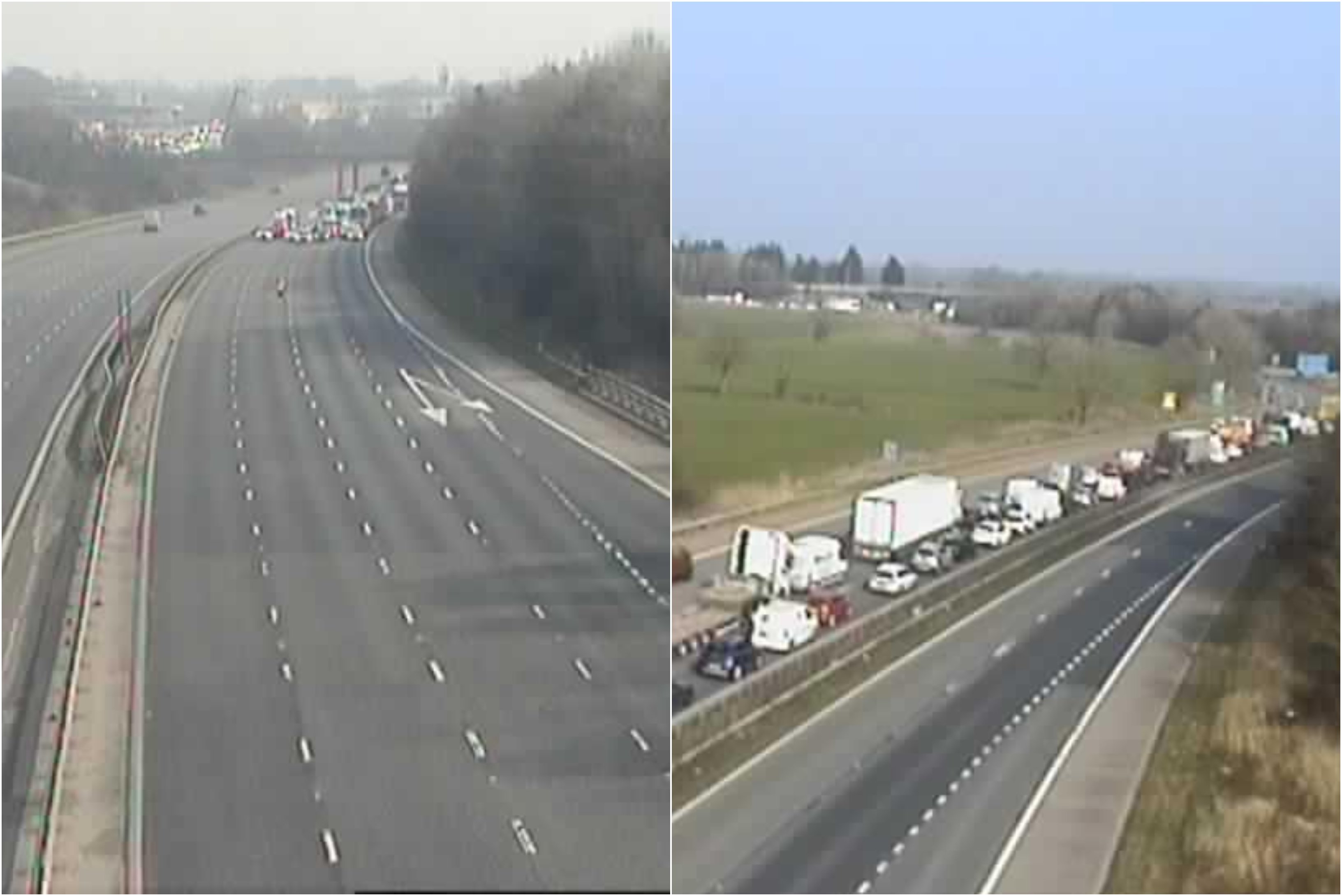Making The Escape To The Country A Reality: A Step-by-Step Plan

Table of Contents
Defining Your "Escape to the Country" Vision
Before you start browsing idyllic cottages online, it's crucial to define what your ideal "escape to the country" truly entails. This involves a thorough self-assessment and realistic expectations.
Identifying Your Needs and Priorities
- Lifestyle: What kind of rural lifestyle are you envisioning? Do you dream of a smallholding and self-sufficiency, a quiet retreat for writing or painting, or perhaps a bustling village life with strong community ties? The possibilities are vast, but defining your ideal lifestyle is paramount.
- Budget: Be realistic about your budget. Consider not only the purchase price of the property but also renovation costs, moving expenses, ongoing maintenance (including potential repairs to older properties), council tax, and the higher running costs often associated with rural properties.
- Non-Negotiables: What are your absolute must-haves? Proximity to good schools, a specific landscape (sea views, rolling hills), access to high-speed broadband, or a certain property type (cottage, farmhouse, barn conversion) – identifying these non-negotiables will streamline your search.
- Lifestyle Changes: Consider the significant lifestyle adjustments involved in an escape to the country. You might enjoy a slower pace of life, increased community involvement, but you should also be prepared for potential feelings of isolation, limited amenities, and longer commutes.
Researching Potential Locations
Once you've defined your ideal lifestyle, it's time to research potential locations.
- Region Selection: Identify regions that match your vision in terms of climate, landscape, and community atmosphere. Do you prefer a coastal escape, a rural retreat nestled in the hills, or a vibrant village with a strong sense of community?
- County and Village Exploration: Narrow your search by exploring specific counties and villages. Use online resources and local guides to research the areas you're considering. Consider commute times to work or other essential services if needed.
- Amenity Check: Thoroughly research the local amenities available. This includes access to healthcare, schools (if applicable), shops, public transport, and recreational facilities. Don't underestimate the importance of reliable internet access in today's world.
- Online & Offline Research: Utilize online resources like Rightmove, Zoopla, and local council websites. Supplement this online research with visits to potential locations to get a feel for the area and community. Talk to locals and estate agents to gather firsthand insights.
Finding the Right Property
With your vision defined and locations researched, the search for your perfect rural property begins.
Utilizing Online Property Portals
- Effective Use: Master the art of using online property portals like Rightmove and Zoopla effectively. Learn how to use filters and search criteria to refine your results based on location, price, property type, and other key features.
- Property Alerts: Set up property alerts so you are instantly notified of new listings matching your criteria. This ensures you don't miss out on potential gems.
- Understanding Jargon: Familiarize yourself with common property descriptions and jargon used in rural property listings. This will help you quickly assess the suitability of each property.
Working with Estate Agents
- Agent Advantages & Disadvantages: Consider the advantages and disadvantages of using a rural estate agent. While they offer expertise and market knowledge, they also charge fees. Research different agents in your target area to find the best fit.
- Asking the Right Questions: Prepare a list of insightful questions to ask during property viewings. This includes questions about the property's history, maintenance costs, and any known issues.
- Negotiating & Conveyancing: Learn about the negotiation process for making offers on rural properties. Understand the conveyancing process—the legal transfer of property ownership—and seek expert legal advice.
Considering Property Types
- Cottages, Farmhouses, Barn Conversions: Research the pros and cons of different property types, such as charming cottages, spacious farmhouses, or characterful barn conversions. Each has its unique appeal and associated challenges.
- Condition Assessment: Carefully assess the condition of any potential property, looking for signs of necessary repairs or renovations. Factor these costs into your overall budget.
- Maintenance Costs: Understand that rural properties often require more extensive maintenance than urban counterparts. Factor these ongoing costs into your long-term budget.
The Practicalities of Moving to the Country
Once you've found your dream property, the practicalities of moving to the country need careful consideration.
Finances and Funding
- Securing a Mortgage: Securing a mortgage for a rural property may present unique challenges compared to urban areas. Research lenders specializing in rural properties and prepare a robust financial application.
- Budgeting: Create a detailed budget that encompasses all aspects of your move, including purchase price, renovation costs, legal fees, moving expenses, and ongoing maintenance costs.
- Alternative Financing: Explore alternative financing options if needed, such as bridging loans or help-to-buy schemes (where applicable).
Utilities and Services
- Broadband: Rural broadband availability can be inconsistent. Investigate different providers and options, such as satellite internet, to ensure you have reliable internet access.
- Utilities: Confirm the availability and connection details for essential utilities such as water, electricity, and sewage. These can vary significantly in rural areas.
- Waste Disposal: Understand local waste disposal and recycling arrangements. These often differ from urban areas.
Community Integration
- Community Groups: Research local community groups and events to help you integrate into your new surroundings.
- Networking: Make an effort to network with your neighbors and local businesses. This is vital for building relationships and integrating into village life.
- Village Life: Get involved in local activities and events to become a part of the community. This can range from attending village fêtes to volunteering for local initiatives.
Conclusion
Making your "escape to the country" a reality requires thorough planning and a realistic understanding of the challenges and rewards. By following this step-by-step guide, you can increase your chances of a successful transition to rural living. Remember to carefully consider your vision, research potential locations, find the right property, and plan for the practicalities of country life. Start your dream "escape to the country" today! Begin your search for the perfect rural property and embrace a new chapter filled with tranquility and adventure. Your perfect countryside retreat awaits!

Featured Posts
-
 Amundi Msci World Ii Ucits Etf Dist Net Asset Value Nav Explained
May 25, 2025
Amundi Msci World Ii Ucits Etf Dist Net Asset Value Nav Explained
May 25, 2025 -
 Serious M6 Crash Live Updates On Delays And Road Closures
May 25, 2025
Serious M6 Crash Live Updates On Delays And Road Closures
May 25, 2025 -
 Porsche 911 Konfiguracio 80 Millio Forint Extrak
May 25, 2025
Porsche 911 Konfiguracio 80 Millio Forint Extrak
May 25, 2025 -
 Artfae Daks Alalmany Tjawz Dhrwt Mars Kawl Mwshr Awrwby
May 25, 2025
Artfae Daks Alalmany Tjawz Dhrwt Mars Kawl Mwshr Awrwby
May 25, 2025 -
 Planning Your Memorial Day Trip Avoid These Busy Travel Days In 2025
May 25, 2025
Planning Your Memorial Day Trip Avoid These Busy Travel Days In 2025
May 25, 2025
Latest Posts
-
 Amundi Dow Jones Industrial Average Ucits Etf Dist A Nav Deep Dive
May 25, 2025
Amundi Dow Jones Industrial Average Ucits Etf Dist A Nav Deep Dive
May 25, 2025 -
 Dreyfus Affair French Parliament Considers Posthumous Honor For Wrongfully Accused Officer
May 25, 2025
Dreyfus Affair French Parliament Considers Posthumous Honor For Wrongfully Accused Officer
May 25, 2025 -
 Understanding The Net Asset Value Nav Of The Amundi Dow Jones Industrial Average Ucits Etf Distributing
May 25, 2025
Understanding The Net Asset Value Nav Of The Amundi Dow Jones Industrial Average Ucits Etf Distributing
May 25, 2025 -
 Net Asset Value Nav Of The Amundi Dow Jones Industrial Average Ucits Etf An Investors Guide
May 25, 2025
Net Asset Value Nav Of The Amundi Dow Jones Industrial Average Ucits Etf An Investors Guide
May 25, 2025 -
 Tracking The Net Asset Value Amundi Dow Jones Industrial Average Ucits Etf
May 25, 2025
Tracking The Net Asset Value Amundi Dow Jones Industrial Average Ucits Etf
May 25, 2025
